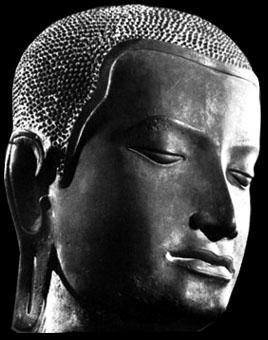
Siddhartha Gautama, known as the Buddha, was born in the sixth
century BC in what is now modern Nepal. His father, Suddhodana,
was the ruler of the Sakya people and Siddhartha grew up living
the extravagant life of a young prince. According to custom,
he married at the young age of sixteen to a girl named Yasodhara.
His father had ordered that he live a life of total seclusion,
but one day Siddhartha ventured out into the world and was confronted
with the reality of the inevitable suffering of life. The next
day, at the age of twenty-nine, he left his kingdom and newborn
son to lead an ascetic life and determine a way to relieve universal
suffering.
For six years,
Siddhartha submitted himself to rigorous ascetic practices,
studying and following different methods of meditation with
various religious teachers. But he was never fully satisfied.
One day, however, he was offered a bowl of rice from a young
girl and he accepted it. In that moment, he realised that physical
austerities were not the means to achieve liberation. From then
on, he encouraged people to follow a path of balance rather
than extremism. He called this The Middle Way.
That night Siddhartha
sat under the Bodhi tree, and meditated until dawn. He purified
his mind of all defilements and attained enlightenment at the
age of thirty-five, thus earning the title Buddha, or "Enlightened
One". For the remainder of his eighty years, the Buddha
preached the Dharma in an effort to help other sentient beings
reach enlightenment.